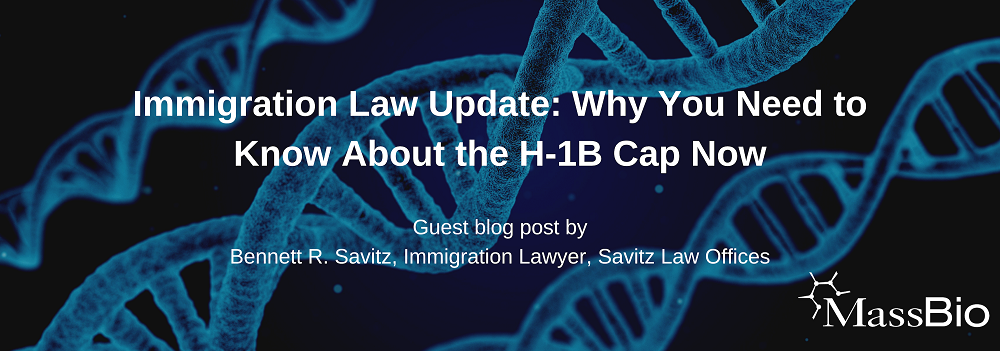
H-1B is an Immigration Law classification for temporary professional workers, and it is the most commonly used category for U.S. employers to hire and employ foreign nationals. The H-1B category is particularly critical for the life sciences industry, as hiring is at an all-time high and hiring departments are therefore often tasked with recruiting foreign experts in a certain disease area or other specific, critical discipline. The H-1B requires a two-step process of applying for and obtaining a certified Labor Condition Application from the Department of Labor, followed by applying on behalf of the candidate for an approval of an H-1B Petition from United States Citizenship and Immigration Services (USCIS). There are many legal requirements and details involved in the H-1B process, but the most urgent aspect of the H-1B for employers to understand is the H-1B cap.
The H-1B cap is a “cap” on the number of H-1Bs available every fiscal year (October 1st to September 30th of the following year). There are 65,000 H-1Bs available to anyone who qualifies, and an additional 20,000 H-1Bs available only to those with an advanced degree from a U.S. educational institution. Since an H-1B petition may be filed up to six months prior to the requested start date, H-1B petitions for FY 2020 (October 1, 2019 to September 30, 2020) may be filed starting on April 1, 2019. Since H-1B numbers are once again expected to run out on April 1st, it is crucial to plan ahead and prepare to file any H-1B petition subject to the cap by April 1st.
When the 65,000 and 20,000 H-1B caps are exceeded on April 1st (as has been the case for the past several years), USCIS uses a computer-generated random selection process (commonly known as a “lottery”) to select a sufficient number of petitions needed to meet the caps of 65,000 for the general category and 20,000 under the advanced degree exemption limit. Petitions not randomly selected are rejected and returned with filing fees. USCIS conducts the selection process for advanced degree exemption petitions first. All advanced degree petitions not selected are part of the random selection process for the 65,000 limit.
In 2018, for the sixth year in a row, the 65,000 and 20,000 caps on H-1Bs available during the Fiscal Year (October 1, 2018 to September 30, 2019) was reached during the April 1st filing window! On April 12, 2018, USCIS conducted a “lottery” to select a sufficient number of petitions needed to meet the caps of 65,000 for the general category and 20,000 under the advanced degree exemption limit (out of 190,098 petitions filed).
Given that the total H-1B cap is only 85,000, managers, recruiters, and human resource departments planning to bring a foreign national from overseas to work in the United States on an initial H-1B visa need to be aware of the H-1B cap. Additionally, the H-1B cap also affects foreign nationals in some other nonimmigrant status such as B, F, J or H-4 who request a change of status to H-1B. For example, anyone who is currently working pursuant to the Optional Practical Training (OPT) portion of their F-1 (Foreign Student) status should be considered for an H-1B filing on April 1, 2019.
There is also a new, related issue that needs to be addressed. On August 9, 2018, USCIS implemented a new policy regarding unlawful presence for certain nonimmigrants, including students in F-1 status (see https://www.uscis.gov/news/uscis-issues-revised-final-guidance-unlawful-presence-students-and-exchange-visitors). A lawsuit has been filed challenging the legality of the new policy and requesting an injunction to prevent its application and enforcement, but unless and until the lawsuit is successful, unlawful presence for anyone in F-1 status is now accruing based on the new policy. Students should have been alerted to this new policy by their schools, but given the severity of the consequences that will start taking effect next month, everyone in F-1 status needs to understand whether and how this policy may affect their eligibility for an H-1B filing on April 1, 2019. Anyone in F-1 status with unlawful presence questions should contact their school immediately.
About The Author

Bennett Savitz
Immigration Lawyer, Savitz Law Offices
Bennett Savitz has practiced exclusively in the area of immigration law since 1994. Since 2008, Bennett Savitz has been selected as one of Boston’s Best Lawyers in Immigration Law by Best Lawyers of America. Best Lawyers of America is a trademarked publication described as “the leading referral list in the legal profession.” Please go to www.bestlawyers.com for the most recent listing. Best Lawyers selects attorneys for listings based upon nominations by and voting by attorneys in the field: “They must earn a spot through exemplary legal work that attracts the notice of their colleagues.” In 2018, Savitz Law Offices was selected as Massachusetts Business Immigration Law Firm of the Year by M&A Insider Awards, and Bennett Savitz was selected as Immigration Lawyer of the Year in Massachusetts by International Advisory Experts and Corporate LiveWire. Additionally, in 2014, Bennett Savitz was selected to be added to The International Who’s Who of Corporate Immigration Lawyers. Since 1994, Bennett Savitz has been an active member of the American Immigration Lawyers Association (AILA), serving on several local and national AILA committees, helping shape policies and procedures for the entire Immigration Bar. He has also served as the Chapter Chair of the New England Chapter of AILA. Bennett Savitz speaks frequently and writes numerous articles on various aspects of Immigration Law. He also authors articles in AILA’s Immigration & Nationality Law, a nationally distributed handbook published annually at the national conference, where he is frequently a speaker. Bennett Savitz was also the Chairman for a series of Immigration Law seminars sponsored by Massachusetts Continuing Legal Education. Additionally, he was the editor of their two-volume reference set entitled, Immigration Law Primer. He is currently teaching Business Immigration Law at New England Law School, and a Graduate School course on Immigration Law and Policy at Lesley University.